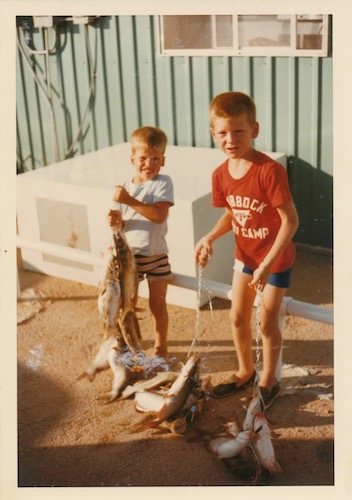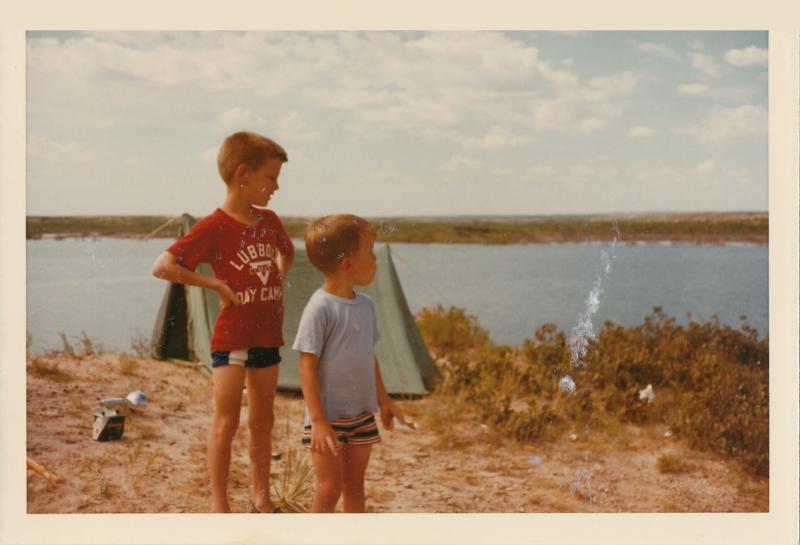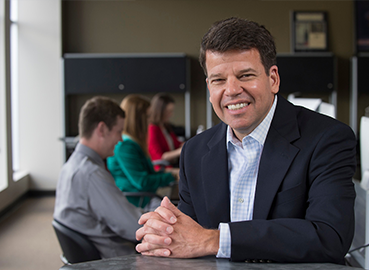Leave Things Better Than You Find Them
My mom and dad weren't big campers. In fact, my mom never went along on a family camping adventure, preferring instead to let my older brother and me suffer the consequences of my dad's questionable planning. Fortunately, my dad braved the elements—and the persnickety personalities of his two young boys—on more than one occasion so that we didn’t entirely miss out on one of the great traditions of the outdoors. And despite my mother’s absences, she had quite an impact on my own experience with nature that's stuck with me ever since.
I was only four years old when my brother and I were loading our gear into the trunk of my dad's ’63 Plymouth Fury for a weekend trip to White River Reservoir where I would be introduced to my first stringer of catfish. In the kitchen, my dad was asking my mom for a couple of paper grocery bags to take along to use for discarding trash. Plastic grocery bags were not a thing yet, and we never had cause to buy plastic trash bags. "We want to leave the place just like we found it," he said to my mom.
"How 'bout you leave it better than you found it?!" Mom shot back without hesitation.
I overheard that exchange through the screen door, and for some reason was more than a little intrigued by the idea. It stuck in my head for the whole weekend, and I challenged myself repeatedly to apply it wherever I ventured. If I encountered trash, even if it wasn't mine, I would pick it up and put it in one of the paper bags my dad had set under the picnic table at our campsite. Maybe I didn't pick up all the trash, but I told myself that all I had to do was to leave things “better”, not necessarily “perfect”.
Today I apply this principle as often as my self awareness allows. If I catch myself having a bad day, it's amazing how often I can trace my mood back to something I did where I failed to apply it. Maybe I provoked a friend with a sarcastic (and unkind) remark, or allowed some frustration to manifest in an inappropriate outburst. Are these things I would allow if my goal were to leave things, including people, better than I found them?
It's in this spirit that I've always tried to approach the work we do at Digett. Take employees, for example, who seldom stick around forever. It's never fun to see a team member leave the flock, and sometimes it downright hurts, but I always appreciate knowing when a teammate has gained knowledge and experience preparing them for their next career chapter. It's good karma, too, at least the way I see it, to leave people better than we found them. Clients, also, will come and go, and that's a good thing. We may cherish the long-term relationships we share with some of them, knowing at the same time it can be healthy for clients to venture out on their own, or to seek assistance from another provider. I only hope I never hear a client tell me they were better off before we worked together.
But how many times have I heard prospects and clients recount stories of having poured thousands of dollars into marketing over the course of months or years while expressing their frustration in having little or nothing to show for it!
What is the Purpose of Marketing?
Marketing is an investment, and investments can turn out good or bad. They can help grow your assets, or deplete them. If done with care, though, with sound decisions outnumbering poor ones, time and money invested in marketing should be converted to outputs and outcomes that are worth more than the inputs. To me, "leaving it better than I found it" means, in the context of a client's marketing program, increasing the value of the marketing asset.
If the concept of the marketing asset sounds new to you, you're not alone. I've looked far and wide for literature on this topic, and it is shocking to me to come up virtually empty handed. There are countless resources that talk about marketing as an investment, but almost nobody ever talks about caring for and tracking the value of the marketing asset—the net worth of an organization’s marketing program— as they would their stock portfolio, or their real estate holdings. I can guarantee that when companies are bought and sold, there is careful consideration given to the value of the marketing asset. And failing to consider the value of your asset, my friends, is opportunity lost, because it can have a profound impact on how you view the effectiveness of your company's marketing efforts.
Placing a dollar value on each and every input, output and outcome can be challenging, if not impossible. But that doesn't mean we shouldn't try, and the value that comes from shifting one’s thinking could put a business on a growth or profitability path never before imagined.
Let’s take three distinct sets of activities that comprise marketing at a high level: Planning, setup and operations. Each of these activities contributes to the overall asset. Planning produces a strategy, an asset. If you think strategy is not an asset, you probably don’t have one. Setup produces a marketing platform we can leverage to execute our strategy. And operations takes the assets produced by the other two activities to produce—in addition to certain desired outcomes—even more assets. Think about how a skillful marketing operations team can increase market reach by cultivating quality email lists. The lists themselves aren’t the desired outcome, but they’re a valuable asset in obtaining that outcome. Consider an ever-expanding library of valuable content. Blog posts and videos are not the ultimate outcomes we are after, but they can definitely contribute in our efforts to achieve those outcomes. How about the improved audience intelligence resulting from skillful A/B testing? Again, intelligence isn’t the end goal, but it’s a valuable asset in the pursuit of our goal.
 All of these assets, tangible or intangible, are ideally carefully nurtured, and yet too often unacknowledged, neglected or ignored entirely. The most common failure I see is one of planning. Firms are quick to deploy tactics without having developed an overall marketing strategy, and it’s the very essence of such strategy to determine not only what tactics could be effective, but how they play a role in cultivating, growing, and measuring the value they contribute to the marketing asset as a whole.
All of these assets, tangible or intangible, are ideally carefully nurtured, and yet too often unacknowledged, neglected or ignored entirely. The most common failure I see is one of planning. Firms are quick to deploy tactics without having developed an overall marketing strategy, and it’s the very essence of such strategy to determine not only what tactics could be effective, but how they play a role in cultivating, growing, and measuring the value they contribute to the marketing asset as a whole.
Picking Up Trash
When, as a four-year-old, I first l latched on to the idea of leaving things better than I found them, I found a simple application that required no planning. If I saw a piece of trash as I explored the shores of White River Reservoir, I picked it up and discarded it in an appropriate place.
Marketing is a bit more complicated, and requires planning, setup and effective operations to maximize short- and long-term impact. If increasing and tracking the value of the marketing asset are incorporated as goals of each of these activities—in addition to achieving other desired outcomes—we can gain immediate clarity on how to better allocate resources, improve outcomes, and maximize return on investment. That’s what I’d call leaving things better than we found them.
Who knew such a simple principle could be so valuable?
MONTHLY MARKETING INSIGHTS.
Get thought-provoking and actionable insights to improve how your firm makes a connection with your customers.






LEAVE A COMMENT